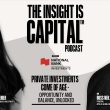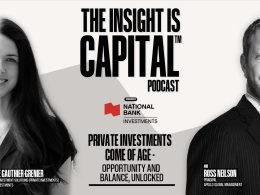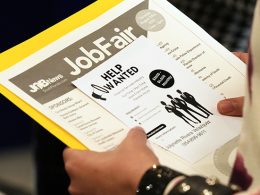by Franklin Templeton Investments blog, Franklin Templeton Investments
The Digest
Last week was remarkable for global equity markets, as the potential for a successful COVID-19 vaccine to be available by spring 2021 drove stocks broadly higher. The Stoxx Europe 600 Index closed last week up 5.1%, the S&P 500 Index was up 2.2% and the MSCI Asia Pacific Index was up 1.4%.1 US pharmaceutical company Pfizer and German biotechnology company BioNTech announced positive trial data for their vaccine, raising hopes of its success and triggering a sizeable equity rotation. Confirmation of Joe Biden’s US presidential election victory was almost a side story for equity markets through the early part of last week. Notably, last week saw the largest-ever week of inflows into global equities of US$44.5 billion, with US$32.5 billion of that into the United States.2
Rotation, Rotation, Rotation
Last Monday saw the largest value over growth outperformance on record—going back to 1991—and the highest weekly outperformance since 2000. Value over growth factor volatility hit its highest level in 20 years last week—higher than during the 2008-2009 global financial crisis and only surpassed by the tech bubble a decade earlier. As such, the year-to-date (YTD) winners were sold in favour of what had been YTD losers. Moves were extreme, which really is no surprise given how extreme positioning has been in the lead-up to last week’s vaccine news.
This rotation drove broad sector moves last week. In Europe, the bank stocks were up 16.5%, energy stocks were up 14.0% and insurance stocks were up 11.8%. These sectors are still far from pre-pandemic levels, but value investors certainly should welcome the respite. The travel and leisure sector was also strong, up 6.9% on the week (airlines were up 23% last Monday alone). Meanwhile, health care, technology, and chemicals stocks underperformed, although these sectors all still remained slightly positive on the week.
It was a similar story in the United States. Energy stocks, notable laggards this year, were up 16.5% but remained down 44% YTD, so there is still a long road to go in terms of a recovery to pre-pandemic levels. Financials were also strong, but weak spots included consumer discretionary and technology. Interestingly, the Nasdaq 100 Equal Weighted Index closed last Friday at new all-time highs.
The same rotation was witnessed in Asia Pacific region. Again, energy and financials stocks were solid performers. The laggards in Asia last week included those sectors that had been strong YTD, including communication services and consumer discretionary stocks.
While the markets cheered the COVID-19 vaccine news, positive vaccine trial data will not do much to help the management of the virus in the immediate term. As we head into the colder months, high rates of infection remain widespread. France, Belgium, the Czech Republic and Austria are among the worst-affected in Europe. German Economy Minister Peter Altmaier also noted that Germany must live with “considerable restrictions” for at least the next four to five months. In the United States, the death toll is close to 250,000, with daily cases hitting new highs. Several states are imposing renewed restrictions on schools, restaurants, gyms, cinemas, etc.
The vaccine, produced by Pfizer and BioNTech, is going through emergency approval. Attention is turning now to who would (and should) be the first to receive it, and what the likely timescale would be. Pfizer reported that the United States ordered 100 million doses, the European Union (EU) 200 million doses and the United Kingdom 40 million doses. It is fully expected that, once approved, key health care workers would be first in line to receive the vaccine in order to limit transmission to vulnerable groups.
Notably, it was reported last Tuesday that a member of the UK government taskforce and professor of medicine at Oxford University, Sir John Bell, believes there is a 70% to 80% chance that the country’s most vulnerable would all be vaccinated by Easter 2021.
Brexit Talks Continue
With the focus squarely on vaccine hopes and US politics, it was easy to forget we are running out of time for the United Kingdom and EU to agree a Brexit deal. It is important to keep an eye on this as we could see extreme volatility in UK assets (and to a lesser extent EU assets) around any news flow.
Talks continued last week, with little evidence of progress on the key outstanding issues: fisheries access, “level playing field” for business, and how any accord would be enforced. However, there was some drama on Downing Street as it was announced two of UK Prime Minister Boris Johnson’s once most-trusted advisors, Dominic Cummings and Lee Cain, were to leave government. They were key architects of the “Leave” campaign; however, the UK’s Chief Negotiator, David Frost, said there would be no fresh concessions and the United Kingdom’s red lines had not changed. UK sterling, a proxy for Brexit risk, was little changed last week, up 0.25%.
In terms of timing, there was talk last week that the “new” deadline would be this Thursday (19 November), when a video conference of EU leaders is scheduled. This would also allow enough time for ratification on both sides. However, over the weekend, there were reports from the UK side that “quite big gaps” still remain, and they doubt that a deal could be struck in the coming days.
Here are the key upcoming events:
- Week commencing November 16: Talks set to continue
- November 19: EU leaders hold video conference
- November 23-26: European Parliament meets
- December 10-11: Another EU summit
- December 14-17: European Parliament meets for last time this year
- December 31: End of Brexit transition period
Much has been made in the financial press of how cheap UK assets are. We are also seeing a number of UK acquisitions recently. No doubt, we shall see more of these if we get confirmation of a Brexit deal and more certainty.
Week in Review
Europe
Last week was another strong one for European equities, with the Stoxx Europe 600 up 5.1%. Reflation rotation was the key theme, clearly driven by the COVID-19 vaccine news (alongside Biden’s US presidential win). Spain’s IBEX 35 Index outperformed quite dramatically, up 13.3% on the week. The outsized move was down to its sizeable skew towards banks as well as travel and leisure. Meanwhile, the UK FTSE 100 Index and the composite Stoxx Europe 600 Index were up 6.9% and 5.1% respectively, clearly lagging due to their large health care weightings.
European equities outperformed the United States last week as YTD as sentiment around the transatlantic trade relationship improved and given Joe Biden’s US presidential victory. It looks like there could be further for European equities to run, especially given the size and duration of its long underperformance vs. the United States.
The European credit market was also in focus after the European Central Bank (ECB) hinted at further support during its scheduled forum. In a speech last Wednesday, ECB President Christine Lagarde said that it was the responsibility of monetary policy to “ensure favourable financing for the whole economy”. Lagarde suggested that we could see a longer quantitative easing (QE) programme at the December meeting.
The spread between Italian and German sovereign bond yields is a key indicator of risk sentiment in the euro area as a whole, as well as Italy itself. Last week, this gap closed to its tightest level in over two years as markets anticipate further bond buying from the central bank.
United States
As in other regions, the positive vaccine news pushed equities sharply higher and triggered some extreme rotation out of momentum names into value. A good example of that rotation theme was in the performance of the small-capitalisation Russell 2000 Index, up 6.1% on the week,3 whilst the NYSE FANG Index was down 4% on the week.
From a technical perspective, it will be interesting to see if the S&P 500 Index can push on from here, as it is very much at the top of its recent trading range.
US politics remain a talking point as current President Donald Trump still refuses to concede he lost the election, despite a lack of any evidence of systemic election fraud. Some observers point to Trump’s tweet over the weekend mentioning Biden had “won” as a sign he may accept defeat. However, it was followed by a continued stream of accusations against a variety of targets before he concludes, “I WON THE ELECTION”.
Despite this rhetoric, there a small but growing number of Republican politicians are now stating it’s time to accept Biden’s election win. In the meantime, Biden’s team stated it’s time for Trump to begin transition and work with an incoming administration to ensure the challenge of soaring COVID-19 cases can be managed in an optimal fashion.
We would note that the race for the US Senate will not ultimately be decided until 5 January 2021, when two seats in the state of Georgia will have a run-off election. The Republicans currently hold a small Senate majority of 50 seats versus 48 for the Democrats, so this Senate race will be a key market focus early in 2021.
COVID-19 cases in the United States are still rising at an alarming rate, and we are seeing signs of some states bringing in stricter measures to slow the spread of the virus. The economic impact of any new measures taken will clearly be crucial for markets, particularly with the US Thanksgiving holiday coming up next week. In addition, the worsening picture creates a greater sense of urgency around a stimulus package being agreed upon; however, bi-partisan talks on this remain stalled.
Asia Pacific
Equities in the Asia Pacific (APAC) region were also broadly higher. Japan’s market was the outperformer, although gains were more muted than European counterparts. Trump continued to apply pressure to China despite his election loss, signing an executive order banning US investors from 31 companies linked to China’s military, including state-owned China Telecom and China Mobile, which both sold off following the action.
The political situation in Hong Kong remains fraught after the government ousted four opposition lawmakers last week. This, in turn, prompted most of the pro-democracy members of the region’s de facto parliament to resign. New powers granted by Beijing last Wednesday allow the removal of lawmakers on the ground of national security. The US government condemned the move.
Equities in the APAC region made gains today after leaders from 15 Asia Pacific nations agreed to one of the biggest trade deals in history. The Regional Comprehensive Economic Partnership (RCEP) aims to reduce barriers and is the first trade agreement to bring together China, Japan and South Korea.
Week Ahead
Monday 16 November
- Economic/Political:
- Brexit crunch time: talks look set to continue in Brussels as the UK and EU approach the latest deadline
- Key speakers: ECB’s Luis de Guindos, Christine Lagarde, Yves Mersch
- Data: Norway trade balance, Italy consumer price index (CPI) EU harmonised, Italy general government debt
Tuesday 17 November
- Economic/Political:
- OPEC+ joint ministerial monitoring committee meets
- Data: Norway Consumer Confidence, Norway gross domestic product, Italy trade balance, Eurozone Construction Output, US Industrial and Manufacturing Production
Wednesday 18 November
- Economic/Political:
- Data: UK CPI & retail prices index (RPI), Eurozone EU27 new car registrations, Eurozone CPI
Thursday 19 November
- Economic/Political:
- EU leaders hold a summit to discuss the bloc’s latest efforts to contain the coronavirus. The summit is also seen as deadline for draft Brexit deal
- Key speakers: ECB’s François Villeroy, Christine Lagarde, Isabel Schnabel
- Data: Netherlands unemployment rate, Sweden unemployment rate, Italy current account balance, Spain trade balance, US weekly jobless claims
Friday 20 November
- Economic/Political:
- Key speakers: ECB’s Christine Lagarde
- Data: UK Public Sector Net Cash Requirement (PSNCR), Germany producer price index, Italy industrial orders, US state employment
Views You Can Use
Insight from Our Investment Professionals
Monitoring Biotech’s Race for a Vaccine
After early analysis of a COVID-19 vaccine from two US and German drug makers showed promising results, Franklin Equity Group’s Evan McCulloch and Wendy Lam are optimistic a vaccine could be available for use in the United States under certain circumstances as early as the end of this year. However, they explain why they see manufacturing and distribution challenges that threaten both broader vaccine adoption and the global economy. Read More.
On My Mind: Knowledge Drives Confidence, Confidence Drives Growth
The Franklin Templeton–Gallup Economics of Recovery Study has heralded some interesting results in regard to the attitudes and behaviour of Americans in response to the ongoing pandemic—and what developments could change both. Our Fixed Income CIO Sonal Desai shares her thoughts on the latest wave of survey findings, including the value of trusted advice in navigating financial and investment concerns. Read More.
US 2020 Election Investment Pulse
Pandemic Reshaping Real Estate
The COVID-19 pandemic has impacted real estate in many ways, but the question for investors in the space is whether the changes it has instigated will be longer-lasting ones. Our Head of Equities Stephen Dover and David Gilbert, CEO and Chief Investment Officer of Clarion Partners, discuss real estate trends today and which areas look more promising than others. Read More.
Policy and Pandemic Drive Macro View
We’ve seen aggressive government and central bank support to stimulate economies sickened from COVID-19 slowdowns, but will the global economy right itself in 2021? Templeton Global Macro CIO Michael Hasenstab and Francis Scotland, Director of Global Macro Research at Brandywine Global, share their macro outlook for the year ahead. They opine on whether the glass looks half empty or half full as the world eagerly awaits a vaccine and as US policies shift amid a change in administration. Read More.
Important Legal Information
This material is intended to be of general interest only and should not be construed as individual investment advice or a recommendation or solicitation to buy, sell or hold any security or to adopt any investment strategy. It does not constitute legal or tax advice. The views expressed are those of the team and the comments, opinions and analyses are rendered as of publication date and may change without notice. The information provided in this material is not intended as a complete analysis of every material fact regarding any country, region or market.
Companies and/or case studies referenced herein are used solely for illustrative purposes; any investment may or may not be currently held by any portfolio advised by Franklin Templeton. The information provided is not a recommendation or individual investment advice for any particular security, strategy, or investment product and is not an indication of the trading intent of any Franklin Templeton managed portfolio.
Data from third party sources may have been used in the preparation of this material and Franklin Templeton (“FT”) has not independently verified, validated or audited such data. FT accepts no liability whatsoever for any loss arising from use of this information and reliance upon the comments, opinions and analyses in the material is at the sole discretion of the user. The companies and/or case studies shown herein are used solely for illustrative purposes; any investment may or may not be currently held by any portfolio advised by Franklin Templeton.
Products, services and information may not be available in all jurisdictions and are offered outside the U.S. by other FT affiliates and/or their distributors as local laws and regulation permits. Please consult your own professional adviser or Franklin Templeton institutional contact for further information on availability of products and services in your jurisdiction.
Issued in the U.S. by Franklin Templeton Distributors, Inc., One Franklin Parkway, San Mateo, California 94403-1906, (800) DIAL BEN/342-5236, franklintempleton.com—Franklin Templeton Distributors, Inc. is the principal distributor of Franklin Templeton’s U.S. registered products, which are not FDIC insured; may lose value; and are not bank guaranteed and are available only in jurisdictions where an offer or solicitation of such products is permitted under applicable laws and regulation.
What Are the Risks?
All investments involve risk, including possible loss of principal. The value of investments can go down as well as up, and investors may not get back the full amount invested. Stock prices fluctuate, sometimes rapidly and dramatically, due to factors affecting individual companies, particular industries or sectors, or general market conditions. Bond prices generally move in the opposite direction of interest rates. Thus, as prices of bonds in an investment portfolio adjust to a rise in interest rates, the value of the portfolio may decline. Investments in foreign securities involve special risks including currency fluctuations, economic instability and political developments. Investments in developing markets involve heightened risks related to the same factors, in addition to those associated with their relatively small size and lesser liquidity.
Past performance is not an indicator or guarantee of future performance. There is no assurance that any estimate, forecast or projection will be realised.
Links to External Sites
Franklin Templeton is not responsible for the content of external websites.
The inclusion of a link to an external website should not be understood to be an endorsement of that website or the site’s owners (or their products/services).
Links can take you to third-party sites/media with information and services not reviewed or endorsed by us. We urge you to review the privacy, security, terms of use, and other policies of each site you visit as we have no control over, and assume no responsibility or liability for them.
___________________
1. Indices are unmanaged and one cannot directly invest in them. They do not include fees, expenses or sales charges. Past performance is not an indicator or a guarantee of future results.
2. Source: Bank of America Global Research.
3. The Russell 2000 Index is an unmanaged list of common stocks that is frequently used as a general performance measure of US stocks of small and/or midsize companies. Indices are unmanaged and one cannot directly invest in them. They do not include fees, expenses or sales charges.
This post was first published at the official blog of Franklin Templeton Investments.














